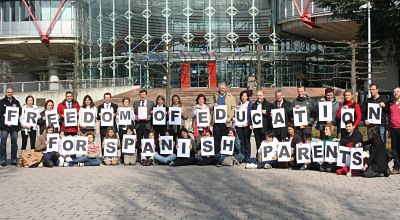Anti-Christian Classes No Longer Mandated in Spain
After a widespread public outcry, including a lawsuit filed with the European Court of Human Rights by the Alliance Defense Fund and Professionals for Ethics, Spain has decided to abandon a compulsory, anti-Christian education course for the country’s public and private school students.
Thousands of lawsuits had been filed opposing the agenda of the “Education in Citizenship” classes, which promoted a leftist stance on crucial social issues such as sexuality and abortion.
Since 2007, more than 54,000 parents registered complaints with Spain’s government over the four-course program, which featured recommended materials that openly bash the Catholic Church and contain highly sexual imagery. The class was mandatory for 10- to 16-year-old students attending Spain’s public and private schools.
Parents and pro-family organizations had filed more than 2,200 lawsuits against the government, with an overwhelming majority of the decided cases falling in favor of parental rights. The suits argued that the compulsory nature of the objectionable classes violated the conscience rights and religious convictions of parents and students alike. Some materials covered in the classes subjected students to explicit sexual images and graphic content denigrating Christianity. However, the same subject matter continued to be taught until now.
ADF and Professionals for Ethics filed the only suit at the European Court of Human Rights, Europe’s highest court. Included in that suit, Bejarano v. Spain, are more than 300 Spanish parents and children, including 105 children from both public and private schools in several Spanish regions.
“The state should respect the right of parents to raise children according to their beliefs,” says Alliance Defense Fund legal counsel Roger Kiska, who is based in Europe. “Spain is rightly respecting basic human rights by abandoning a class that forced students to participate in values training contrary to their convictions.”
Spain’s new minister of education, Jose Ignacio Wert, has now decided to replace the class with a new class on European Union institutions and Spain’s Constitution.
“This is not just a victory for Spain but for the watching world as well,” says Kiska. “Many American parents, for example, would be dismayed to know that activist organizations in the U.S. actively seek to persuade school districts to use similar types of curriculum. If the Spanish government had continued this instruction, it would only have emboldened arguments that the U.S. should follow suit.”














































